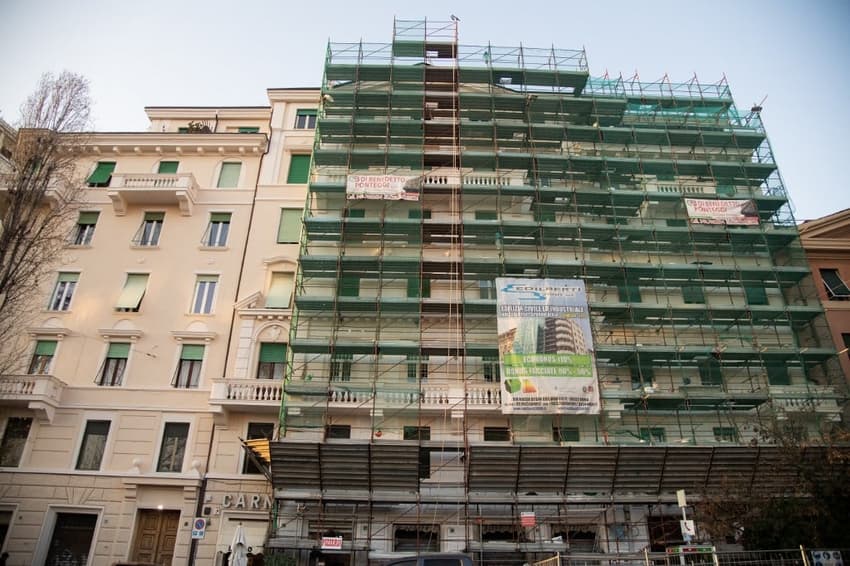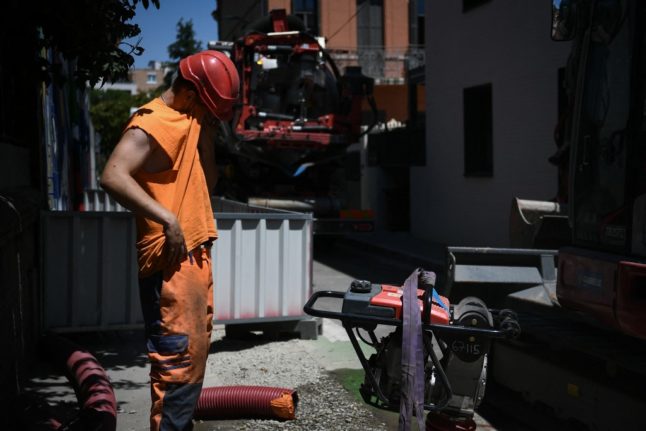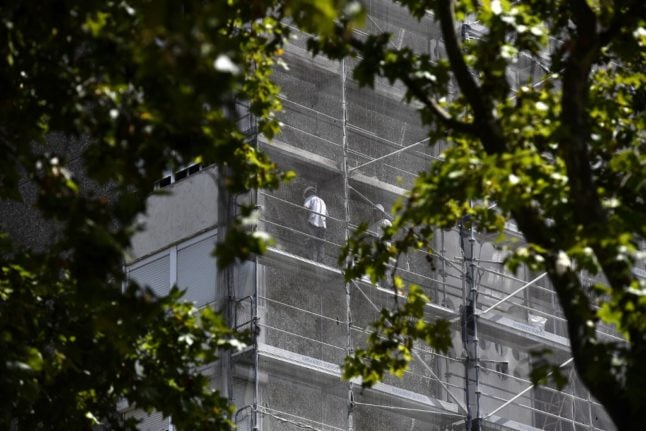KEY POINTS: What Italy’s new superbonus decree means for you

There’s been a new round of changes to Italy’s building ‘superbonus’ but will this resolve the issues homeowners face? From timeframes to credit transfers, here’s what it means for you.
The Italian government has put together a new decree containing amendments to its popular building superbonus scheme, after sweeping changes under a hastily-approved decree in mid-February left unresolved questions.
The most pressing demand the government faces is for a solution to the credit transfer impasse that has halted countless renovation projects since early 2022. The deadlock has resulted in billions of euros’ worth of ‘stranded’ credit which industry groups say now threatens to leave many building firms bankrupt and renovation projects unfinished.
Homeowners were also concerned about timeframes for claiming the original maximum 110-percent rebate, after the ‘superbonus 110’ was swiftly turned into a ‘superbonus 90’ in January.
After Italy’s Senate gave the final seal of approval to the new superbonus decree on Wednesday evening, here’s an overview of the main changes it brings in.
Good news for independent or single-family home owners
Under the new decree, those renovating independent or single-family homes will be able to claim a full 110-percent rebate up until September 30th 2023 – as long as they can prove that at least 30 percent of the planned work had already been completed by September 30th 2022.
READ ALSO: Reader question: Has Italy's 'superbonus 110' been scrapped?
The maximum rebate available under the bonus was slashed from 110 percent of the total cost of works to 90 percent last January, but the owners of independent or single-family homes were given until March 31st 2022 to claim the full rebate.

The maximum rebate available under Italy's superbonus was slashed from 110 percent of the total cost of works to 90 percent last January. Photo by Valentine CHAPUIS / AFP
That deadline has now been extended by six months.
It’s worth stressing that the above only applies to projects that had reached a 30-percent completion status by September 30th 2022.
Block on sale and transfer of credit confirmed for new works
As announced in February, the two main routes for accessing the superbonus are no longer available to most new applicants.
The new decree confirmed that the sale of tax credit to a bank in exchange of cash (cessione del credito) and the transfer of credit to the construction company in exchange for an invoice discount (sconto in fattura) will not be available to homeowners who started renovation works after February 16th 2023.
READ ALSO: EXPLAINED: Are any of Italy’s building 'bonuses' still available?
This leaves the above category of owners with the least convenient of the three original claiming routes: tax deductions spread over four years (detrazione fiscale), which is effectively only available to those paying the highest rates of income tax.
However, the new decree also confirmed that both options (sale and transfer) will remain available to people looking to claim Italy’s earthquake bonus (or sismabonus).
What’s the plan to unclog blocked credit?
Though media reports suggested that the Italian government was preparing a major intervention on this front, the decree confirms that banks and other credit institutes will largely remain responsible for unblocking the logjam at this stage.
Italian banks will use their own financial resources to move along credits.

Problems with the exchange of superbonus credits have stalled countless renovation projects around the country. Photo by Pau BARRENA / AFP
Once they’ve used up their own resources, they’ll be able to exchange part of the accrued credits (10 percent each year) with Long-term Treasury Bonds (Buoni del Tesoro Pluriennali, BTP).
Extension for the sale of 2022 credit
Homeowners who completed their planned renovation works in 2022 will have until November 30th 2023 to sell their accrued tax credit to either a bank or an insurance company.
READ ALSO: 'Out of control': Why has Italy curbed its building superbonus?
The deadline to sell tax credit in exchange for cash and inform Italy’s Tax Revenue Agency (Agenzia delle Entrate) of the sale was originally set for March 31st 2023.
However, homeowners who failed to find a buyer by that date will now have eight more months to sell their tax credit, though they will have to pay a 250-euro fine.
It’s worth pointing out that this only applies to people who completed their planned works by the end of 2022.
Tax deductions spread over 10 years for 2022 projects
Homeowners who completed their renovation work in 2022 will be able to claim the bonus in the form of tax deductions spread over 10 years as opposed to four.
By lowering the amount of the yearly tax breaks, the above amendment effectively makes the deduction route (detrazione fiscale) available to a larger pool of homeowners.
That’s because superbonus funds can only be accessed through tax deductions if one's yearly income tax (Irpef) bill is higher than the yearly bonus-related tax break.
That said, the 10-year deduction scheme will only be available from 2024, meaning homeowners won’t get any tax breaks in 2023.
Please note that The Local cannot advise on individual cases. For more information on claiming Italy’s building bonuses, homeowners are advised to consult a qualified Italian building surveyor or independent financial advisor.
See more in our Italian property section.
Comments
See Also
The Italian government has put together a new decree containing amendments to its popular building superbonus scheme, after sweeping changes under a hastily-approved decree in mid-February left unresolved questions.
The most pressing demand the government faces is for a solution to the credit transfer impasse that has halted countless renovation projects since early 2022. The deadlock has resulted in billions of euros’ worth of ‘stranded’ credit which industry groups say now threatens to leave many building firms bankrupt and renovation projects unfinished.
Homeowners were also concerned about timeframes for claiming the original maximum 110-percent rebate, after the ‘superbonus 110’ was swiftly turned into a ‘superbonus 90’ in January.
After Italy’s Senate gave the final seal of approval to the new superbonus decree on Wednesday evening, here’s an overview of the main changes it brings in.
Good news for independent or single-family home owners
Under the new decree, those renovating independent or single-family homes will be able to claim a full 110-percent rebate up until September 30th 2023 – as long as they can prove that at least 30 percent of the planned work had already been completed by September 30th 2022.
READ ALSO: Reader question: Has Italy's 'superbonus 110' been scrapped?
The maximum rebate available under the bonus was slashed from 110 percent of the total cost of works to 90 percent last January, but the owners of independent or single-family homes were given until March 31st 2022 to claim the full rebate.

That deadline has now been extended by six months.
It’s worth stressing that the above only applies to projects that had reached a 30-percent completion status by September 30th 2022.
Block on sale and transfer of credit confirmed for new works
As announced in February, the two main routes for accessing the superbonus are no longer available to most new applicants.
The new decree confirmed that the sale of tax credit to a bank in exchange of cash (cessione del credito) and the transfer of credit to the construction company in exchange for an invoice discount (sconto in fattura) will not be available to homeowners who started renovation works after February 16th 2023.
READ ALSO: EXPLAINED: Are any of Italy’s building 'bonuses' still available?
This leaves the above category of owners with the least convenient of the three original claiming routes: tax deductions spread over four years (detrazione fiscale), which is effectively only available to those paying the highest rates of income tax.
However, the new decree also confirmed that both options (sale and transfer) will remain available to people looking to claim Italy’s earthquake bonus (or sismabonus).
What’s the plan to unclog blocked credit?
Though media reports suggested that the Italian government was preparing a major intervention on this front, the decree confirms that banks and other credit institutes will largely remain responsible for unblocking the logjam at this stage.
Italian banks will use their own financial resources to move along credits.

Once they’ve used up their own resources, they’ll be able to exchange part of the accrued credits (10 percent each year) with Long-term Treasury Bonds (Buoni del Tesoro Pluriennali, BTP).
Extension for the sale of 2022 credit
Homeowners who completed their planned renovation works in 2022 will have until November 30th 2023 to sell their accrued tax credit to either a bank or an insurance company.
READ ALSO: 'Out of control': Why has Italy curbed its building superbonus?
The deadline to sell tax credit in exchange for cash and inform Italy’s Tax Revenue Agency (Agenzia delle Entrate) of the sale was originally set for March 31st 2023.
However, homeowners who failed to find a buyer by that date will now have eight more months to sell their tax credit, though they will have to pay a 250-euro fine.
It’s worth pointing out that this only applies to people who completed their planned works by the end of 2022.
Tax deductions spread over 10 years for 2022 projects
Homeowners who completed their renovation work in 2022 will be able to claim the bonus in the form of tax deductions spread over 10 years as opposed to four.
By lowering the amount of the yearly tax breaks, the above amendment effectively makes the deduction route (detrazione fiscale) available to a larger pool of homeowners.
That’s because superbonus funds can only be accessed through tax deductions if one's yearly income tax (Irpef) bill is higher than the yearly bonus-related tax break.
That said, the 10-year deduction scheme will only be available from 2024, meaning homeowners won’t get any tax breaks in 2023.
Please note that The Local cannot advise on individual cases. For more information on claiming Italy’s building bonuses, homeowners are advised to consult a qualified Italian building surveyor or independent financial advisor.
See more in our Italian property section.
Join the conversation in our comments section below. Share your own views and experience and if you have a question or suggestion for our journalists then email us at [email protected].
Please keep comments civil, constructive and on topic – and make sure to read our terms of use before getting involved.
Please log in here to leave a comment.